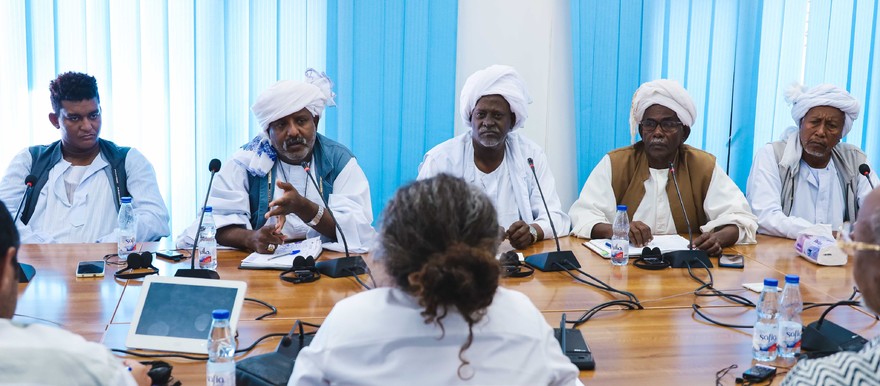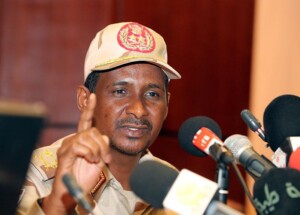Eastern Sudan’s Adarob faction of the Beja Nazirs Council refuses invitation to join upcoming negotiations

AU-IGAD-UN Trilateral Mechanism representatives met with a delegation from The Beja High Council led by Ibrahim Adarob on Wednesday (UNITAMS)
The High Council of Beja Nazirs and Independent Chieftains faction led by Ibrahim Adarob told Radio Dabanga that it was invited by the Trilateral Mechanism to participate in the upcoming Final Agreement negotiations but refused after not being included in the previous stages.
AU-IGAD-UN representatives met with a delegation from the Beja High Council faction led by Ibrahim Adarob “as part of the Trilateral Mechanism’s facilitation role in the ongoing political process”, according to a press statement after a meeting on Wednesday.
Abdallah Obshar, spokesperson for the group which calls itself the High Leadership Authority of the High Council of Beja Nazirs and Independent Chieftains, said that during the meeting the Trilateral Mechanism invited them to participate in upcoming workshops on the issue of eastern Sudan in preparation for the Final Agreement with the military junta.
In an interview with Radio Dabanga yesterday, Obshar explained that their Beja Council group, led by Ibrahim Adarob, refuses “to participate in any solutions developed without its prior involvement”.
Beja council rift
The High Council of Beja Nazirs and Independent Chieftains witnessed a rift this summer in which a faction opposed to Sudanese Beja Nazir Sayed Tirik, who was President of the council, made its own plans under the leadership of Obshar.
The group announced the formation of committees to prepare for the right to self-determination, according to the stipulations of the Sinkat conference.
Obshar told Dabanga that they now called for the implementation of agreements made with a delegation of UNITAMS in October last year, which include the cancellation of the Eastern Sudan Protocol included in the Juba Peace Agreement, the establishment of a negotiating platform on governance issues of eastern Sudan (Red Sea state, Kassala, and El Gedaref), with the guaranteed involvement of the international community, and reconciliation conferences between the various communities in the region.
He explained that the workshop held by the High Council of Beja Nazirs and Independent Chieftains chaired by Sayed Tirik in Khartoum on Wednesday was organised to reformulate the outcomes of the two Sinkat Conferences. Obshar stressed that the 11 decisions of the last Sinkat Conference “should be implemented, not drafted again”.
Obshar said that they were not invited to the workshop chaired by Tirik and called it “an attempt to circumvent the decisions of the Sinkat Conference and tear the Beja apart”.
Democratic Block
Mohamed Osman El Mirghani, leader of the Khatmiya Sufi order and president of the mainstream Democratic Unionist Party (DUP), announced that he plans to set up a negotiating platform “for the people of the east to solve the problems of eastern Sudan and achieve political and societal consensus and development”.
The DUP joined the Forces for Freedom and Change-Democratic Block alliance formed in November by rebel signatories of the Juba Peace Agreement who are taking part in the current government.
Tirik was appointed as the block’s Deputy Chairman in what was called “an excellent step to expanding political participation”. The Adarob-led faction of the Beja Nazirs Council, however, voiced its disapproval.
We were even not notified” of Tirik’s decision to join the Democratic Block, he said. “This step has seriously disrupted the reconciliations that take place within the council”.











 and then
and then